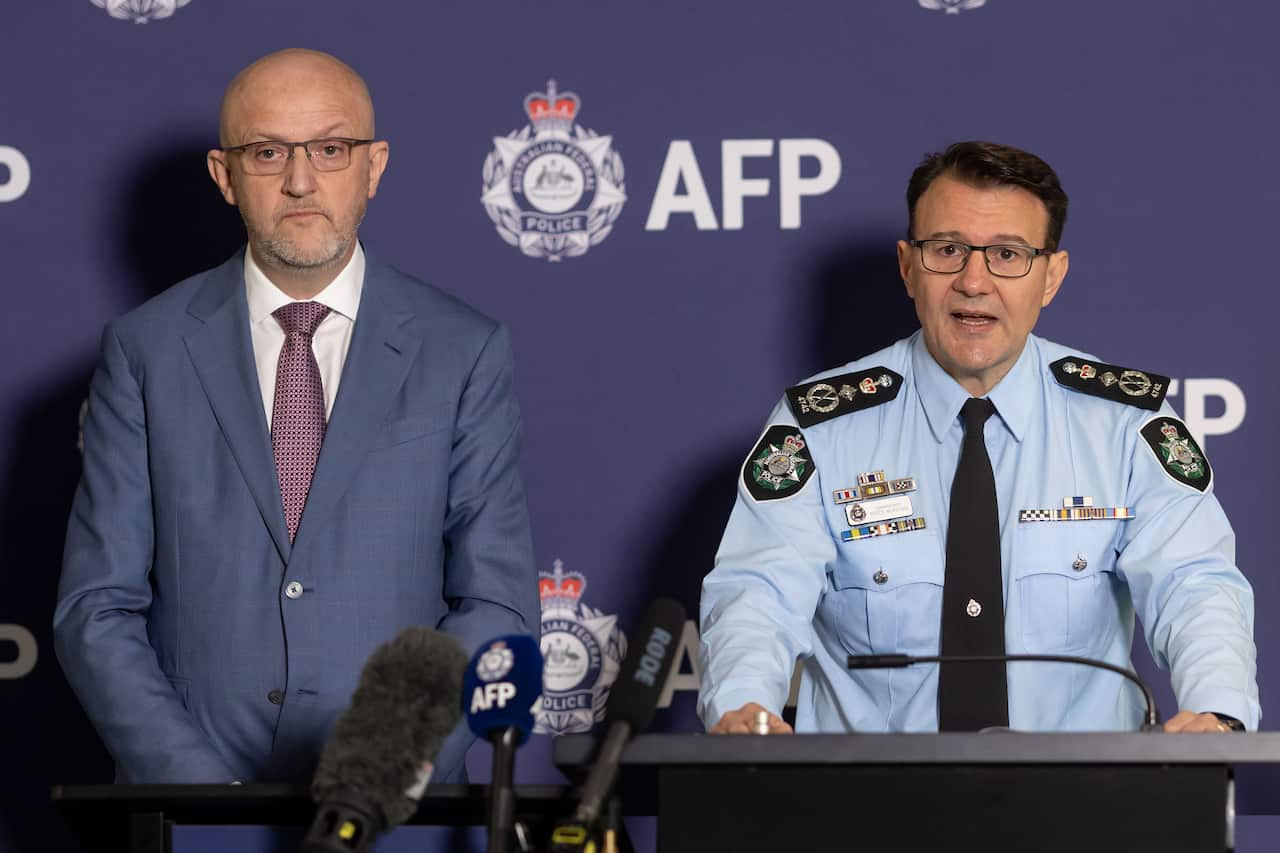Two Russian-born Australian citizens have been charged with espionage, marking the first time charges have been laid under laws introduced in 2018.
They were arrested as part of a joint investigation between the Australian Federal Police (AFP) and the Australian Security Intelligence Commission (ASIO).
Who has been charged with espionage?
AFP Commissioner Reece Kershaw announced on Friday that a couple had been arrested at their Everton Park home in Brisbane on Thursday.
Police allege Kira Korolev — a 40-year-old Australian Defence Force (ADF) army private — and Igor Korolev — a 62-year-old self-employed labourer — were working together to obtain sensitive information to share with Russian authorities.
It's alleged the woman undertook non-declared travel to Russia in 2023 while on long-term leave from the ADF, for which Kershaw said she had worked as an information systems technician for several years.
While in Russia, she allegedly told her husband to access her official work account and send specific information to her private email account.
Kershaw said it "remains a key focus of our investigation" as to whether the information was handed over to Russian authorities, adding that "no significant compromise" had yet been identified.
The couple were already married when they came to Australia together about 10 years ago and had since become citizens, Kershaw said.
He said the woman obtained citizenship in 2016 and her husband in 2020,
Asked if they had retained their Russian citizenship, Kershaw said: "They had Russian passports".
Australian intelligence agencies haven't named a Russian agency the pair allegedly worked for, or specified when they became aware of the alleged plot.

A 62-year-old man and a 40-year-old woman were arrested on Thursday. Credit: Australian Federal Police
Burgess noted that security clearance vetting wasn't a panacea when asked how the pair were able to access classified information.
"Vetting is not a solution that stops problems," he said.
"If you meet the requirements to get a security clearance you'll get a security clearance but that doesn't mean to say the security journey stops at this point."
"We will work with defence to work through what is the teachable moment here if there are any."
Kira Korolev's matter was heard in the Brisbane Arrest Court on Friday under the charge of preparing for an espionage offence.
She did not appear and was denied bail by Magistrate Ross Mack, with her matter moved to the Commonwealth Court on 20 September.

AFP Commissioner Reece Kershaw (right) said the couple came to Australia about 10 years ago. Source: AAP, Supplied / Australian Federal Police
No bail application was made with Korolev remanded in custody to appear in the Brisbane Magistrates Court on 20 September.
It is the first time espionage charges have been laid since federal laws were introduced in 2018.
What has the Australian Defence Force said?
In a statement, the Australian Defence Force said it "takes all breaches of security seriously".
"In response to serious allegations, it is general practice to suspend an ADF member from service, including immediately cancelling the member’s access to Defence bases and ICT systems," the statement read.
"Defence continues to work with the Counter Foreign Interference Task Force.
"As this matter is before the courts and due to personal privacy obligations, Defence will not make further comment."
What has Russia said?
The Russian Embassy in Canberra on Saturday accused Australia's Federal Police and spy agency chiefs of stoking "anti-Russian paranoia".
"The press conference of AFP and ASIO chiefs on 12 July was clearly intended to launch another wave of anti-Russian paranoia in Australia," the embassy said in a statement.
"Theatrical tricks were used like talking to imaginary 'Russian spies' presumed to be all around."
The embassy has requested the situation and status of the arrested duo and will consider appropriate measures of consular assistance.
At a press briefing on Friday, Kremlin spokeperson Dmitry Peskov said only that he had no detailed information about the case.
"Yes, for us, they are Russian citizens, but they have always lived there, in Australia, so we don't have details about that, and I can't tell you anything," he said.
What has the prime minister said?
Prime Minister Anthony Albanese said he had been "briefed extensively" on the espionage charges by security agencies.
Following the Russian embassy's statement, Albanese told Russia to "back off". He added that the country had no credibility and that it engaged in espionage around the world.
"How about you get out of Ukraine and stop the illegal and immoral war that you're engaged in and how about you try to stop interfering in domestic affairs of other sovereign nations.
"This is a country that has no respect for international law, and they should be regarded with contempt, which is what I have for them."

Prime Minister Anthony Albanese said while Australians lived in "uncertain times", the country's security agencies were "doing their job". Source: AAP / Darren England
"They're constantly trying to find ways to engage and to damage our national interest, and that's why our agencies ensure that they are constantly monitoring their performance."
What do we know about foreign interference in Australia?
The federal government said last week and would create a hub to support multicultural communities who have been targeted by foreign spies.
In his annual threat assessment delivered in March this year, and foreign interference than ever before.
He later revealed a former politician who engaged in espionage for a foreign country was a serving member of an Australian parliament when they were recruited.
"The espionage threat is real," Burgess told reports on Friday.
"Multiple countries are seeking to steal Australia's secrets. We cannot be naive and we cannot be complacent. Espionage is not some quaint Cold War notion; espionage damages our economy and degrades our strategic advantage. It has catastrophic real-world consequences."
have warned clandestine operations against people here by governments such as Iran, Rwanda and Cambodia, could descend into violence if left unchecked.
With additional reporting by the Australian Associated Press and Agence France-Press.









